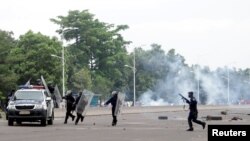DRC President Joseph Kabila blamed the opposition for this week's deadly protests and again endorsed dialogue. The U.N. human rights chief, however, slammed what he called the government's "extremely confrontational response" to protesters, saying at least 50 people were killed.
Has the violence only further complicated the path to a negotiated solution?
With a written statement read by a presenter on state media, President Joseph Kabila gave his response to this week's deadly unrest.
He condemned the organizers of Monday's march a large opposition group known as Le Rassemblement or The Assembly, saying they had diverted their supposedly peaceful demonstration towards, in his words, "blind violence or worse, bloody riots.
Once more Kabila urged all of the DRC's political parties to join the dialogue in order to find a peaceful path to elections.
Talks started earlier this month with help from the African Union but have struggled for credibility. Le Rassemblement rejected them as "a trap" designed to maintain Kabila in power beyond the end of his second term in December and instead called for Monday's demonstration to demand Kabila step down.
A smaller opposition coalition did join in the dialogue, but the talks were suspended this week amid the violence. They are due to restart on Friday.
Juvenal Munubo, an opposition parliamentarian and a delegate at the talks, told VOA that instead of participating in the dialogue, the Rassemblement called for protests which resulted in deaths and repression on the streets of Kinshasa.
He urged them to reconsider and join the dialogue. "I believe the door to dialogue remains open. The door is always open," he said.
But the prospect for a negotiated solution took another hit on Tuesday. The body representing the Catholic Church known as CENCO suspended its participation in solidarity with those killed this week.
CENCO condemned what it called the security forces' heavy handed response to protesters.
Hans Hoebeke is senior Congo analyst at the International Crisis Group said "CENCO is the institution with at least a larger level of legitimacy than any of the political and social actors in Congo."
"Since the start of 2016, they have tried to build a more inclusive platform around the need for a dialogue," he said. "To have some degree of legitimacy, any agreement coming from the current dialogue has to include the signature of the CENCO. Without that, a lot of the other social and probably political organizations are not going to sign it."
CENCO says even if it does return to the dialogue, it will not put its name to any agreement which does not include an explicit commitment from the president not to stand in the next election because a third term is forbidden by the Congolese constitution.
Polls were supposed to be held in November but now aren't expected before 2018 as the electoral commission says it needs time to compile a new voter list.
